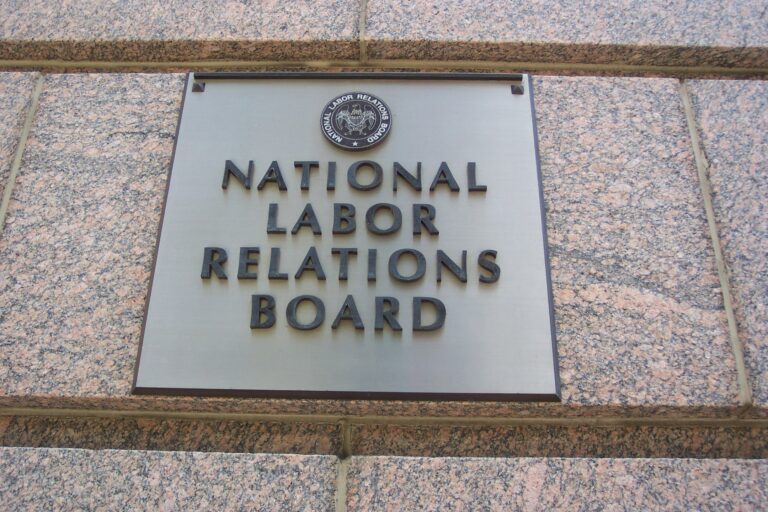Jovana Karanovic is a PhD Candidate in the Department of Knowledge, Information & Networks (KIN) at the School of Business and Economics, Vrije Universiteit.
Twitter: @karanovic_j
The Case of the UK and the Netherlands

Deliveroo riders’ protest in Amsterdam in front of Deliveroo’s Dutch office, 14th of November, 2017.
On Tuesday, Deliveroo – an online on-demand food delivery company currently operating in 11 countries – won a UK court decision that frees the company from the responsibility of offering minimum wages and holiday pay to their bike-riding delivery workers (or “riders”). On the very same day, Deliveroo riders in the Netherlands took to the streets of Amsterdam to voice their dissatisfaction with the company’s recent decision to abolish employment contracts. The workforce of 1,750 riders in the Netherlands will need to register as independent contractors if they wish to continue delivering food for Deliveroo. Are the critics right that Deliveroo is “gaming the system”, and do riders want what they cannot get?
The UK court confirmed that riders are self-employed
The case in the UK was brought by the Independent Workers Union of Great Britain (IWGB) after Deliveroo failed to recognize it as a union representing workers, which would entitle IWGB to collectively bargain over workers’ rights. The UK body, the Central Arbitration Committee (CAC), ruled that Deliveroo riders are self-employed and thus not entitled to basic employee rights. The CAC decision was based primarily on the fact that riders can bring in “a substitute” to cover their shifts: under UK law, the inability to send someone else to execute your tasks is key to the legal status of “worker.”
What do riders in the Netherlands want?
The case in the Netherlands is slightly different from the UK case because the transition from employees to self-employed results, in the Netherlands, in the loss of rights to which riders were initially entitled. As self-employed, riders will no longer be entitled to minimum wages, insurance, pension, and the right to collectively bargain over their wages and contracts.
A night before the protests in Amsterdam took place, riders received an email from Deliveroo (see below) urging them to restrain from what the firm called “unofficial action.” which, as they say, “may lead to disciplinary action.” The email, however, did not stop the riders, who believe their basic work rights are not being met. Riders stood in front of Deliveroo’s Dutch branch chanting: “What do we want? Security! When do we want it? Now.” The Riders Union, which organized the protests, demands that Deliveroo take the following steps:
- Abolish its plan to implement an independent contractor system;
- Sign a collective labor agreement;
- Accept a works council;
- Offer a permanent employment contract to all the riders who have had three temporary contracts (which is in line with Dutch employment regulations)
(Source: https://www.ridersunion.nl/home/nl/)
Is Deliveroo gaming the system?
IWGB lost the case in the UK, but they are planning to appeal. Their appeal will be based in part on their argument that Deliveroo recently made a number of changes to “game the system.” These changes include 1) the ability of riders to have someone else substitute for them, 2) removal of performance monitoring, and 3) withdrawal of the requirement that riders wear the company’s branded clothing. IWGB believes that Deliveroo strategically introduced the changes to avoid its legal responsibility of providing workers the basic rights they deserve.
Can the riders win the fight?
Time will tell how the court case will resolve, and how Deliveroo will respond to the protests. But there is another question the firm must answer: whether they want to be a company that manipulates employment arrangements in order to avoid its legal and ethical responsibilities. In my view, rather than trying to avoid employment law, Deliveroo should be in favor of smarter regulations. Here’s why:
Gig workers create all the value in the gig economy
In the same way Airbnb is the world’s biggest hotel chain without owing a single hotel/house, Deliveroo has a network of 16,000+ restaurants without owing single one. In order for them to deliver food to consumers, they need a huge network of riders. Without the network of riders, there is no Deliveroo. Therefore, if Deliveroo riders decide to stop working, Deliveroo will simply fail to meet the consumer demand
Flexibility is a luxury, but it comes with a price
Deliveroo and other service-based platforms persistently assert that their platforms are not meant to provide full-time income but simply compliment an individual’s existing income. They also advocate for flexibility. Flexibility, however, is not only a luxury for workers, but for the platforms as well. The ability to mobilize the workforce whenever the demand arises, is one of the key advantages platforms have over traditional businesses. For companies this translates into more profit, but for workers to more insecurity, since one day they have a lot of work, and the other none. Therefore, companies must compensate the workers for it.
A collective fund could be a solution
Platforms are hesitant to provide workers with the things those workers need – holiday pay or pension, for example – because they fear that doing so will result in a decision that the workers are employees.
A possible solution would be to form an independent body that would function as a collective fund to which all the gig economy platforms would chip in and which would then issue funds to workers in case of illness, injuries, and give them holiday allowance. Since most workers already work for multiple platforms to earn full time income, it would make sense that they draw funds from all the platforms they work for.
After all, companies, consumers, and workers are all interconnected and none of them can meet their needs without the other. If we are to create the working environment in which we progress towards a better future, we must listen to one another and craft regulations for the gig economy that express compassion.
Deliveroo’s email to riders regarding the planned protests in Amsterdam on the 14th of November
Email sent on the 13th of November, 2017 at 20:26
Title: We want to hear from you










Daily News & Commentary
Start your day with our roundup of the latest labor developments. See all
July 11
Regional director orders election without Board quorum; 9th Circuit pauses injunction on Executive Order; Driverless car legislation in Massachusetts
July 10
Wisconsin Supreme Court holds UW Health nurses are not covered by Wisconsin’s Labor Peace Act; a district judge denies the request to stay an injunction pending appeal; the NFLPA appeals an arbitration decision.
July 9
the Supreme Court allows Trump to proceed with mass firings; Secretary of Agriculture suggests Medicaid recipients replace deported migrant farmworkers; DHS ends TPS for Nicaragua and Honduras
July 8
In today’s news and commentary, Apple wins at the Fifth Circuit against the NLRB, Florida enacts a noncompete-friendly law, and complications with the No Tax on Tips in the Big Beautiful Bill. Apple won an appeal overturning a National Labor Relations Board (NLRB) decision that the company violated labor law by coercively questioning an employee […]
July 7
LA economy deals with fallout from ICE raids; a new appeal challenges the NCAA antitrust settlement; and the EPA places dissenting employees on leave.
July 6
Municipal workers in Philadelphia continue to strike; Zohran Mamdani collects union endorsements; UFCW grocery workers in California and Colorado reach tentative agreements.